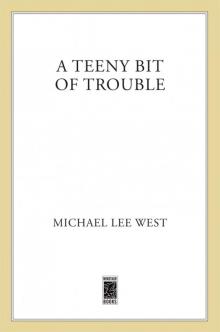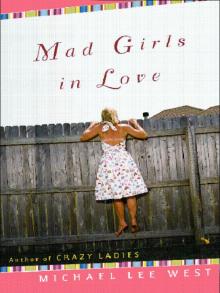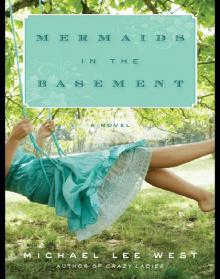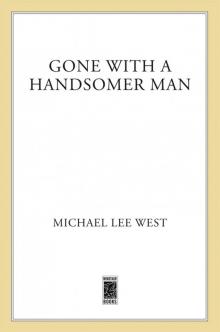- Home
- Michael Lee West
Mermaids in the Basement Page 16
Mermaids in the Basement Read online
Page 16
“Daddy?” she kept saying. “Open your eyes, Daddy.”
Kip hunkered next to her, cutting open the judge’s sleeve with a pocketknife.
“Am I still alive?” Judge Stevens coughed. “Damn it, my arm. Did he blow it off, or what?”
“Sir, it just nicked you.” Kip pulled off his jacket, then the quail-studded vest, and wrapped his shirt around the judge’s arm. “You were lucky.”
“Oh, Daddy,” Shelby said, then she gave me a hard look. I bit my lip, and a moment later I tasted blood and iron.
It was almost dusk, and night was filling up the air. We’d long since returned from the emergency room. Judge Stevens’s shoulder and arm were bandaged and put into a sling. He had fallen asleep on the porch swing, a mug of Jack Daniel’s gripped in his free hand. When I tried to lift it, he clamped down on the handle.
“I’m not sleeping,” he murmured. “I’m just resting my eyes, is all.”
Grendel reached around and bit the fur above her stubby tail, grunting hard. Her fingernails clicked on the plank floor. After a minute, she lifted her head, sensing, perhaps, that I was staring. The dog gave a disgusted snort, then looked past the swing, past the screen mesh. Her ears twitched when the old tom leaped off Kip’s old truck and walked toward the barn.
Shelby pulled on a sweater and ducked outside to secure the horses for the night. She knelt down to stroke the old tom; he rubbed his head against her leg. Then she crossed the driveway, toward the barn, clucking to the horses. They stopped grazing, ears perked, and trotted toward the paddock. After she locked the gate, I walked down the porch and followed her into the tack room, watching as she dumped sweet feed into the bins. The horses whinnied as the grain rattled; they trotted restlessly back and forth in the paddock.
“I’m sorry about your daddy.” My stomach growled, and a moment later, I tasted bile.
“It was an accident, honey.” The filly dipped her nose into a bucket. Shelby touched the forelock, threading her fingers through the coarse hair. The filly was starting to turn dapple gray, and her hind legs were still spindly, delicate as wineglasses.
Over by a dusty window, Kip stood in front of an old table, cleaning the game. From the portable radio in the tack room, Pure Prairie League was singing “Amie.”
“Is the judge all right?” asked Kip. Behind him, the tom leaped through the window, cobwebs sticking to his fur. A bare lightbulb dangled from its wire, swinging back and forth over the wooden table. The table was covered with newspapers. A bottle of Wild Turkey, half empty, stood on a shelf. Shelby walked past me, and I smelled gunpowder. Quail were heaped on one end of the long table. On the other side, closer to where Kip was working, lay a pile of bloody feathers. The feathers were brown, spotted white, now thickly matted. He pulled off a bird’s head and began peeling down the skin. The smell of blood and whiskey rushed up my nose. My stomach turned over, and I felt something hot spurt into my throat. My hand jerked up to my mouth, and I lunged forward, vomiting into the feathers.
“Damn,” said Kip. “I thought he was a heart surgeon.”
“He is,” said Shelby.
“Sorry,” I said, and wiped my mouth. “I’ve been fighting nausea all day.”
“We ate at Honora’s yesterday,” Shelby said.
“S’okay, boy,” Kip said, gutting the bird with a knife. “Hope you didn’t eat any of Isabella McGeehee’s cooking. She’s lethal in a kitchen.”
“He gorged on her sweet potatoes,” Shelby said.
“Boy, you like to live dangerously.” Kip shook his head.
Shelby picked up two skinned quail and carried them to the old porcelain sink. She held them beneath a stream of water. I coughed and bent over a bale of hay, retching again.
“Louie?” Shelby frowned. “You look pale. Are you all right?”
“I’ve got to get air,” I said. “I’ve got feathers up my nose.” I stumbled out of the barn. If I could just lie down with a cold rag over my head, I’d feel better. Midway toward the house, I broke into a run. Mr. Stevens’s rocking chair was empty. I yanked open the screen door and shot inside the house. Before the door slapped shut, Grendel ran down the steps and squatted in the yard.
I sat down at the kitchen table, running my hand through my hair. I’d made a fool of myself in front of Kip and Shelby. I wanted to explain that it wasn’t the blood and feathers. Hell, I’d handled hearts in my hands, stitching together arteries and minute vessels. Then I wondered if I’d lost my nerve. Maybe I wasn’t such a tough guy, after all. The operating room was a controlled environment. There was no smell, except for the faint, burned odor of the cautery machine. The nurses wore masks, gloves, scrub suits, and paper caps; they draped the patient with sterile green cloths. It was easy to forget that a human being lay beneath those cloths. I would lean over, holding the scalpel, and without hesitation, I’d make an incision. Blood welled up, and a gloved hand reached out with gauze and blotted it. I’d tell the nurses what instrument I wanted, and they’d get it. They did anything I asked. Which was the exact opposite of how I got treated at home.
At dusk, I walked back to the barn. I didn’t see Shelby or Kip. The table was littered with blood and feathers, and from the radio Jim Morrison was singing “The End.” Over my head, in the hayloft, I heard floorboards screek, and I thought I smelled alfalfa. The tom stalked mice along the rafters, shrinking back as cold air blew through the loft, riffling his fur in the wrong direction.
Outside, a horse neighed, and I recognized Grendel’s high-pitched yowl.
Above me, I heard a scrabbling nose, followed by my wife’s voice. “I don’t like the sound of that barking,” she said. A minute later, she and Kip climbed down the ladder. Hay was stuck to their backs and elbows. Kip’s shirt was unbuttoned.
“What the hell is going on?” I said. Outside, Grendel yelped, and Shelby ran out of the barn. Kip and I followed. By the time we reached the paddock, Grendel was limping toward the fence, holding out her front paw. Her mouth was rimmed with blood.
“Grendel?” I called, thinking the horse had kicked her. The dog ignored me and hopped toward the fence, over to Shelby. In the security light beside the barn, I saw the filly. She was lying on her side, blood spurting from her hind leg.
“Shit! Shit!” yelled Kip. He climbed the fence and leaped to the other side. The mare stamped toward him, flattening her ears against her head. She pawed the ground, threatening to strike with her front hooves. Kip pulled off his undershirt, squatted down beside the filly, and pressed the shirt to the wound. The cloth bloomed with color. The filly kept trying to get up, bracing her hooves in the dirt, her head arched forward. Shelby skidded under the fence and ran over to the filly. I started toward Grendel. She growled, then crawled under the fence, stretching her hind legs as she scooted forward, then she limped toward the house.
“Hold pressure on it, just like this.” Kip pressed Shelby’s hand over the shirt. Then he slid under the fence and ran over to his truck. He reached into the back, pulled out a flashlight and a battered first aid case, then ran back to the paddock. I started toward the fence—hell, if an artery had been severed, I could suture it. I was Dr. DeChavannes, I could do anything. I started to climb over the fence, and Shelby hollered. “Stay back, Louie,” she called. “You’re not feeling well.”
I ignored her, hopped onto the fence, then dropped to the other side, my shoes sinking into mud. I jogged over to the filly. Kip was trying to clamp a hemostat over the pumping arterial bleed, but I could tell that he didn’t know what he was doing. I elbowed him aside, then flung off the bloody shirt and plucked the hemostat from his hands.
“Hold the flashlight over the filly,” I told him. “Shelby, open the first aid kit and see if you can find suture materials.”
Her hands fumbled on the clasp, then she flung open the kit, rummaging inside. “I don’t see any.”
“Run inside and get a needle and thread,” I told her. “And antiseptic, if you have it.”
She looked up, her ha
ir streaming down. Her eyes were gunmetal gray, and cold. I wondered what the hell she and Kip had been doing in that hayloft. Then I looked down at her hands.
Blood pumped through her fingers, little commas splashing onto her shirt. I knew she was afraid to move, afraid the filly would bleed to death.
“Get the thread, honey,” I said, then I nodded at Kip. “Give me some light, buddy.”
He clicked on the flashlight and aimed the beam over the filly’s leg. Shelby let go, and a jet of blood spattered my sweater. As she ran toward the house, I clamped the hemostat over the artery, and blood stopped pumping.
“Shoot, I coulda done that,” said Kip.
I started to say, I can cut hair, too. But I held my tongue and waited for Shelby. I saw a shadow moving around the paddock, then she ran over to me, slinging down a sewing box and a bottle of rubbing alcohol. They restrained the filly while I threaded the needle and splashed alcohol over it.
I felt Shelby’s breath on my neck as I tied off the artery, removed the hemostat, and sutured the skin back together. Over Shelby’s bowed head, the moon wafted over the pines, and way out in the woods, a pale quivering sound started up, Bob-white! Ah-bob-white!
“You saved her,” said Shelby, but Kip glared.
Yeah, I thought. I saved the horse, but sure as I was sitting here, I was going to lose the girl. Maybe, just maybe, I already had.
Chapter 23
TEARS OF A HUNDRED LOVERS
All night the wind blew over Alabama as the tropical depression moved into the Gulf of Mexico. For several hours I had sensed a change in the barometric pressure, a prickling along my spine and static electricity in what remained of my hair. Inside, I felt just as volatile. One minute I wanted to fly over to Ireland, and the next I wanted to stay in Point Clear and set free a couple of Gucci handbags.
Up in my room, I opened the casement window. Night air stirred the gauzy curtains, carrying the scent of mock orange. I couldn’t see the bay, but I could hear waves smashing against the pier. Somewhere in the dark a storm was gathering strength. My thoughts drifted back to Ferg. I missed the way he’d push my hair out of my eyes and how he’d show up with a bottle of merlot and a cheese ball. I missed how he held me in the night. But I couldn’t allow myself to think about him. If Ferg didn’t want me, fine. The last thing I wanted was to end up like my parents.
I shut my eyes, imaging the bay tossing foam and shells and tiny blue minnows onto the sand, then sucking everything back again. I pressed my face against the feather mattress, the smells and sounds of water blowing around me. Just as I fell asleep, I thought I heard my mother whisper, I will always love you. I will always be with you.
When I woke up, it was dark outside. I heard rain ticking against the trees, a fine-grained sound like grits poured into a saucepan. I threw back the covers and slid out of bed. Then I bent over the trunk, peering inside. Near the bottom right-hand corner, wedged against the brittle paper lining, I pulled out a wrinkled page from the Pensacola newspaper.
* * *
Pensacola SUN
January 15, 1973
WOMAN FALLS THROUGH PARTIALLY FROZEN BAY
The Perdido Key Fire Department pulled a Louisiana woman, Shelby DeChavannes, 31, from Wolf Bay last Saturday evening at 6 p.m. She was taken to a local hospital and treated for frostbite. The bay was partially frozen due to record-breaking temperatures that swept through the Panhandle last week. The local Audubon society rescued hundreds of shorebirds from Wolf Bay after their feet adhered to the ice. The Perdido Key Fire Chief, Eddie Coggins, advises residents to avoid inland bays, and under no circumstance should they attempt winter sports, such as ice skating. “This isn’t Maine or Wisconsin,” said Chief Coggins. “This is the Gulf Coast, and inland waters might look froze, but it’s just on the surface. If a person falls through the ice, they could be dead in ten minutes.” Information about water safety and frostbite is available at the Perdido Key Fire Station.
* * *
I tucked the article into my robe pocket and walked down the hall into Honora’s room. Sunlight forked down the creamy walls, illuminating dozens of family photographs. The air smelled faintly of cigarette smoke and Robert Piaget’s Fracas. Unlike the rest of the house, her bedroom was quiet and restful, with tone-on-tone beige. She had taken great care to add textures: a rough jute rug, a white wicker chaise with a silk plaid cushion; an ivory porcelain vase holding a dozen lilies; an ornate shell-encrusted mirror hanging over a painted dresser. The bed was an old iron four-poster, draped in muslin panels. An overstuffed ivory chair was angled beside the window, giving long views of the bay.
“Honora?” I called. “Are you decent?”
I leaned toward the window and pushed back the curtain. There, far out in the bay, I saw a small, capped figure doing the breaststroke. Honora was swimming. I started to turn out of her room, but couldn’t leave without taking a peek inside her closet. In the old days, it had been a “new baby nursery” with adjoining rooms for a nanny; but Solange DeChavannes’s architect had transformed the space into a “wardrobe room.” In fact, it was rumored that Vogue had patterned their famed “cupboard” after Solange’s gargantuan closet.
Now, I stepped into a room with white, furniture-like cabinets, housing furs, ball gowns, and suits. Deep drawers lined the lower part of the cabinets. I slid one open—sunglasses. Another held gloves. An armoire held great stacks of orange Hermès boxes. Directly over my head, a twelve-armed crystal chandelier tossed out a confetti of colors.
This room opened into a hallway with four doors on the right-hand side: the first led to a “spring/summer” room; the second was dedicated to fall/ winter items; the third opened into a jewelry room, where everything from necklaces to bracelets to earrings dangled from small gold hooks. The heirlooms were locked into a freezer-sized vault. The fourth door led to a handbag room, its walls lined with cubbyholes and hooks. They were subdivided into summer and winter. Before I left the room, I ran my hands over a vintage Jackie O Gucci, a Chanel bowling bag, and several Hermès bags, along with a jeweled Leiber “sleeping cat” minaudière. The vintage bags had belonged to Solange. My grandfather, Chaz, had been raised to believe that every woman loved designer bags, and he’d never stopped to think that Honora might prefer something else for Christmas and Mother’s Day. Now, many of the cubbyholes were empty, thanks to Honora’s weekly bag-releasing runs, but she still had an enviable collection.
I walked downstairs and sat on the kitchen counter, waiting for the coffee to brew. Gladys ran a feather duster over the tables, humming “My Heart Stood Still.” From the counter, the little TV showed a white circle bubbling in the Gulf like a pot of gumbo, full of rice and shrimp and crab claws. According to the weatherman, the tropical depression was headed straight for Gulf Shores.
“Humph,” said Gladys. “Maybe it is, maybe it ain’t. Them weathermen can’t predict doodly.”
Even though I’d spent the better part of my life in California, I always panicked when storms blew into the Gulf of Mexico. My mother would call Honora and Gladys a dozen times, making sure they were all right. She used to say that tropical depressions could spring up overnight. Any storm that moved into the Gulf could stir up trouble. There was just no place for it to fizzle. But it could just as easily blow over to the eastern seaboard and skitter off into the Atlantic. You just never knew about storms. They reminded me of the unstoppable, unpredictable force of life with the power to change everything or nothing.
Honora had often talked about Hurricane Camille, how she’d tied up the draperies, then pulled everything out of the dresser drawers, stuffing underwear and pajamas onto the highest closet shelves, but it all got ruined anyway. Muddy water filled the house, buckling parquet floors and bursting out the windows.
Gladys used to say that storms carried gossip from other towns. The story of a heartbreak, the sound of a baby’s cry. The tears of a hundred lovers. “Close your eyes and listen,” she’d say. “Can you hear the voices?”
; I thought they sounded like a woman weeping; other times I heard music. Blues and jazz pouring up into the night, the notes swarming like mosquitoes. The coast was a different world, a jambalaya of the senses. Full of danger and dampness and desire. Heat and hazards and heartbreak.
I leaned across the counter and switched off the television. Then I clicked on the little radio beside the toaster. Old Dick Haymes was singing “The Very Thought of You.” He was probably dead by now, but his smooth voice lived on.
Reaching into my pocket, I pulled out the article. I’d heard the grown-ups whispering about Mama’s accident, but when I’d pressed for details, they’d clammed up. “Your mama just got cold, is all,” Gladys said. I thought she meant that my mother had an illness, a cold virus, and it never occurred to me to ask more questions.
Gladys stepped into the kitchen, swiping the feather duster along the counter. “What you reading, baby?” she asked.
“How did my mama end up in a frozen bay?” I held out the article.
“It was half froze,” said Gladys.
“She told you about it?”
“No, I was there.”
“And?”
“How many love-gone-wrong stories must I tell?” She shook her head.
“Until there are no more?”
“They’ll always be love stories, baby,” she said. “Even if the world stops spinning, there will always be more.”
Chapter 24
RESCUE
If you dream of putting roses in your hair, then you will be deceived by someone you love. If you dream of your hairdresser, you will soon be entangled in a family scandal or moral dilemma. I am making this up. But this one thing is true: nobody ever leaves a warm bed for a cold one.

 A Teeny Bit of Trouble
A Teeny Bit of Trouble Mad Girls In Love
Mad Girls In Love Mermaids in the Basement
Mermaids in the Basement Gone With a Handsomer Man
Gone With a Handsomer Man